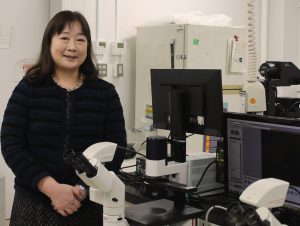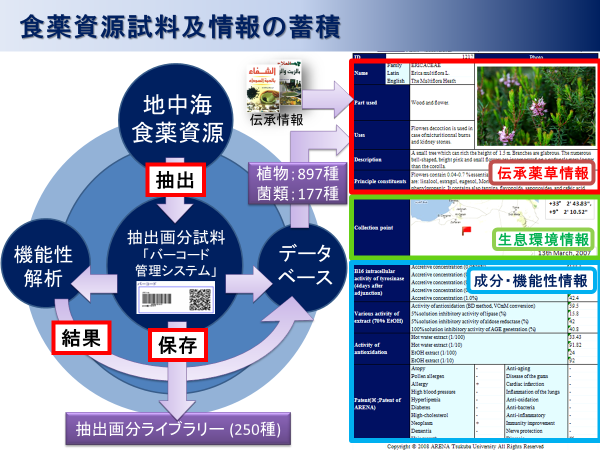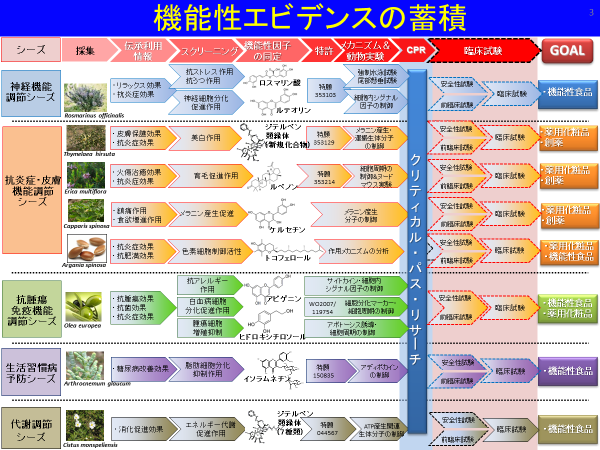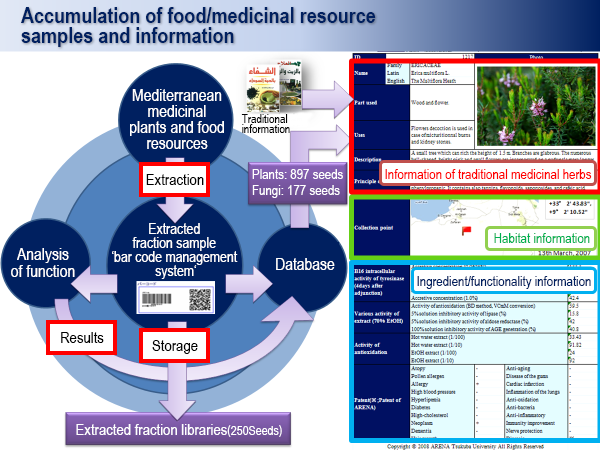他のメンバー : VILLAREAL MYRA ORLINA 王政 Marcos Antonio das NEVES 柏木 健一 本嶋秀子 高橋 真哉 KHALID NAUMAN 柳沢 正史 小久保 利雄 福住 昌司 我妻 ゆき子 大河内 信弘 金保 安則 橋本 幸一 前田 清司 五所 正彦 田村 憲司 上條 隆志 南雲 陽子 川田 清和 松原 康介 弥永 真生 佐々木 一憲 大藏 倫博 内田 史彦 和氣 泉 今井 久也 小松 美保 浜野 由起子 山本 万里
他機関 : 佐藤 一彦 浅川真澄 永尾 雅哉 片倉喜範 清水 邦義 植松勝太郎 植松勝久 秋長 正幸 早川 功 谷口 格 小池 泰介 福光 聡 間 和彦 山内 優輝 岡田孝夫 杉山幸宏 エル オムリアブデルファテー 馬冬梅 大谷則子 新藤幹雄 佐藤富男 深山和子 酒井良雄 鈴木誠 森英郎 小松美穂 神村彩子 森田国彦 渡邊史子 秋月さおり 鈴木貴視 高橋恵一 中庭譲 望月美沙緒 上田哲也 椛沢ゆき子 鈴木陽子 山川一義 佐野省吾 河合清 岩戸薫 細川隆史

機能性表示食品の流行からもわかるように、食品の機能性研究の需要は年々高まっています。 とりわけ地中海圏のオリーブやローズマリー、アロマ植物などは150万人もの被験者を対象としたメタ解析研究の蓄積があり、世界で最も科学的なエビデンスがある食薬資源として注目されてきました。
国際食薬・リサーチユニットが取り組むのは、食品の機能性の研究と、植物などの生理活性物質である天然物創薬の研究です。人への作用を通じて有効性が認められてきた伝承食薬の科学的なメカニズムを解明することで、食薬資源に恵まれている地域に対し、資源の販売のみならず、産業化や雇用を創出するのが目標です。
膨大なデータベースとライブラリを持ち、企業との共同研究が進む地中海北アフリカ研究センター

図1:食薬資源試料及情報の蓄積
私たちのリサーチユニットは、培養細胞やモデルマウスを用いて生理機能を測定するバイオアッセイを行い、地中海食薬資源の様々な機能性を科学的エビデンスに基づき探索しています。その拠点となる地中海・北アフリカ研究センターは、890種以上の地中海食薬データベースと250種類以上のライブラリを所蔵しており、薬用化粧品や機能性食品になるポテンシャルを持つ多くの素材が蓄積されています。こうしたノウハウやデータベースを用いて、これまでにおよそ20社の企業とコンソーシアムを作って共同研究を進め、素材・製品の開発をしてきました。
また、地中海・北アフリカ研究センターは、生物多様性条約に則り、創薬の研究成果を現地に還元する協定を当該国政府と締結しています。2005年に締結してから15年が経ちましたが、今でもこのような協定を結んでいる日本の機関は他にありません。日本における国際食薬分野の唯一無二の機関として、地中海にある食薬資源をはじめとした様々な素材を日本企業に提案する窓口としても機能しています。
食薬資源をエビデンスベースで産業化し、当該国の雇用創出を目指す

図2:シーズ別に見る機能性エビデンスの蓄積の過程
当リサーチユニットの最終目的は、創薬の利益を当該国に還元することです。バイオサイエンス部門に加え、材料・エネルギー・環境部門、人文社会科学部門、マネジメント・イノベーション部門を設置しており、食薬資源の機能性研究に留まらない体制を構築しています。人文社会科学部門による現地の方とのコミュニケーションや聞き取りには大変有効なものとなっています。また昨年11月に設立した産総研・筑波大食薬資源工学オープンイノベーションラボラトリにおいては、食薬資源由来の安価な抽出物を触媒反応で高価格のものへ変換する技術を開発しており、AIを使った機能予測なども取り入れて、素材の高付加価値化に取り組んでいます。こうした高価な食薬の発見や高機能性食薬の科学的な実証は、素材の付加価値を生み出し、産業化や雇用創出に繋がる可能性があります。「持続可能な開発目標(SDGs)」にも通じる取り組みとして、開発経済学の研究者と連携しながら研究を進めています。
また、これまで培ってきた研究成果の日本への還元も考えています。日本は現在、高齢化による医療費が40兆円を超えていますが、機能性表示食品の普及で病気を予防し、健康寿命を延ばせる可能性もあります。鬱やストレス、若年性アルツハイマーなど神経機能に関するエビデンスの蓄積は若年層に対しても貢献できると考えられます。このように食薬・創薬の研究は、広範な分野に還元できるものです。
社会への貢献・実績
-
JST地球規模課題対応国際科学技術協力事業「乾燥地生物資源の機能性解析と有効利用」(2011~2015年度)
-
ST地球規模課題対応国際科学技術協力事業「エビデンスに基づく乾燥地生物資源シーズ開発による新産業育成研究」(2016~2020年度)
-
「産総研・筑波大食薬資源工学オープンイノベーションラボラトリ」を設置(2019年)地中海食薬資源由来希少化合物の触媒反応による量産化に成功
取材日:2020年2月5日
Aiming at industrialization and job creation by research and drug discovery of Mediterranean medicinal plants and food medicines
Unit members : Villareal, Myra Orlina 王政 Marcos Antonio das, Neves Kashiwagi, Kenichi MOTOJIMA Hideko Takahashi, Shinya KHALID NAUMAN Yanagisawa, Masashi Kokubo, Toshio Fukusumi, Shoji Wagatsuma, Yukiko Ohkohchi Nobuhiro Kanaho, Yasunori Hashimoto, Koichi Maeda, Seiji Gosho, Masahiko Tamura, Kenji Kamijo, Takashi Nagumo, Yoko Kawada, Kiyokazu Matsubara, Kosuke Yanaga, Masao Sasaki Kazunori OKURA, Tomohiro Uchida Fumihiko WAKI Izumi Imai Hisaya Komatsu Miho Hamano Yukiko Yamamoto Mari
Other agencies : Sato Kazuhiko Asakawa Masumi Nagao Masaya KATAKURA Yoshinori SHIMIZU Kuniyoshi Uematsu Katsutaro Uematsu Katsuhiko Akinaga Masayuki Hayakawa Isao 谷口 格 小池 泰介 福光 聡 間 和彦 山内 優輝 岡田孝夫 杉山幸宏 エル オムリアブデルファテー 馬冬梅 大谷則子 新藤幹雄 佐藤富男 深山和子 酒井良雄 鈴木誠 森英郎 小松美穂 神村彩子 森田国彦 渡邊史子 秋月さおり 鈴木貴視 高橋恵一 中庭譲 望月美沙緒 上田哲也 椛沢ゆき子 鈴木陽子 山川一義 佐野省吾 河合清 岩戸薫 細川隆史
Unit name: Food and Medicinal Plants
Keywords: food/medicinal resources, Bioassay, functional food, natural compound drug discovery, cosmeceuticals
https://isodalabtsukuba.wordpress.com/

As shown by the popularity of foods with functional claims, demands for study on the function of food have been increasing year by year. Especially, meta-analysis studies on Mediterranean olives, rosemary, and aromatic plants involving 1.5 million subjects have been accumulated, attracting attention as food/medicinal resources with the most scientific evidence in the world.
The research unit, Food and Medicinal Plants, copes with studies on food function and drug discovery of natural compounds, which are physiological active substances including plants. The objectives are not only sales of resources but also industrialization and job creation in regions blessed with food/medicinal resources by elucidating the scientific mechanisms of traditional medicinal plants and food medicines with efficacy validated through their actions on humans.
Alliance for Research on the Mediterranean and North Africa with a huge database and library advancing joint studies with companies

Fig. 1:Accumulation of food/medicinal resource samples and information
Our research unit performs bioassays measuring physiological functions using cultured cells and model mice and searches for various functions of Mediterranean medicinal plants and food resources based on scientific evidence. Alliance for Research on the Mediterranean and North Africa serving as a base for it possesses a database of more than 890 seeds of Mediterranean medicinal plants and food medicines and more than 250 libraries, accumulating many materials with the potential to become cosmeceuticals and functional foods. Using these know-how and database, we have established consortia with about 20 companies, advanced joint studies, and developed materials and products.
In addition, Alliance for Research on the Mediterranean and North Africa concluded an agreement on returning accomplishment of drug discovery to the locals in accordance with the Convention on Biological Diversity. Fifteen years have passed since the agreement in 2005, but there is no other Japanese institution which concluded such an agreement. As the one and only institution in the international food and medicinal plant field in Japan, our institution also functions as a window to propose various materials including Mediterranean food/medicinal resources to Japanese companies.
Evidence-based industrialization of food/medicinal resources aiming at job creation in the country

Fig. 2:Process of functional evidence accumulation by seeds
The ultimate goal of our research unit is to return the benefits of drug discovery to the country. In addition to the bioscience department, material/energy/environment department, human and social sciences department, and management/innovation department have been established, constructing a system not limited to study on the function of food/medicinal resources. These are very effective for communication with and listening to the locals performed by the human and social sciences department. National Institute of Advanced Industrial Science and Technology/University of Tsukuba food/medicinal resource engineering open innovation laboratory established in November last year has developed a technique converting a food/medicinal resource-derived low-cost extract to a high-price material by catalysis, coping with the adding of values to materials by incorporating the prediction of the function using AI. Discovery of these high-price medicinal plants and food medicines and actual scientific proof of high-function medicinal plants and food medicines produce added values of materials, which may lead to industrialization and job creation. We are advancing studies in cooperation with development economics researchers as an approach leading to ‘sustainable development goals (SDGs)’.
We also consider returning the acquired study results to Japan. In Japan, at present, medical expenses have exceeded 40 trillion yen due to aging, but the spread of foods with functional claims may prevent diseases and extend the healthy life expectancy. Accumulation of evidence concerning nerve function, such as depression, stress, and juvenile Alzheimer’s disease, may benefit the young. Therefore, the results of studies on medicinal plants and food medicines and drug discovery can be returned to extensive fields.
Social contributions and achievements
-
JST Science and Technology Research Partnership for Sustainable Development Project ‘Functional analysis and effective utilization of dry land biological resources’ (fiscal 2011-2015)
-
JST Science and Technology Research Partnership for Sustainable Development Project ‘Evidence-based study developing new industry seeds by developing seeds of dry land biological resources (fiscal 2016-2020)
-
Establishment of ‘National Institute of Advanced Industrial Science and Technology/University of Tsukuba food/medicinal resources engineering open innovation laboratory’ (2019). Mass production of Mediterranean medicinal plants and food resource-derived rare compound by catalysis.
Interviewed on Feb. 5, 2020
